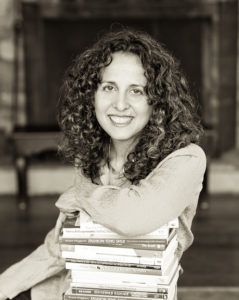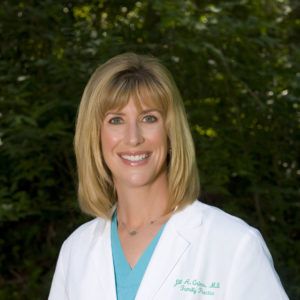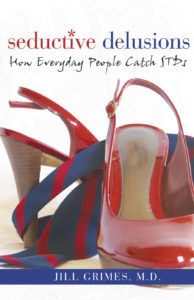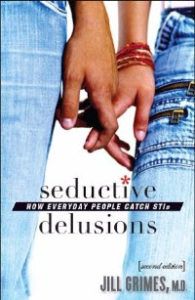
I love to interview authors who got their publishing start through Harvard Medical School’s CME publishing course, because they have such great stories to tell and often have gotten the “best of the best” advice from the many publishers and agents who attend.
When Julie Silver, MD, the course director, suggested I interview Jill Grimes, author of Seductive Delusions: How Ordinary People Get STD’s, I loved the idea–after all, I wanted to know how a family physician came up with this concept–and I was curious about her readership–were they people with STD’s or were people really thinking prevention?

Here’s the scoop…and more…
Lisa: As a family physician, how did you come up with a book on STDs?
Jill: It’s great to be able to “fix” people’s problems- strep throat, sprained ankle, high blood pressure… I felt frustrated because I can’t “fix” viral STDs.
Young people burst into tears when it sinks in they have genital herpes or warts…for LIFE. I wanted a better method of prevention.
My private practice is all very over-educated & financially upper end–the very population we routinely diagnose with STDs, but who think it can never happen to them. Stories are more powerful than statistics…So, what began as a handout with some “typical” stories to educate my patients evolved into a book.
Lisa: Were you clear from the start about exactly what your book would be, or did the course at Harvard, your agent and publisher significantly affect the book concept?
Jill: I THOUGHT I was clear on exactly what my book was, but the publisher had other (excellent) suggestions, as did my agent. I pictured (and had written) a ten chapter, ten pages each book that was a collection of stories of young “beautiful” people as they were diagnosed with an STD.
I was surprised when they told me that no one wanted to publish a 100 page book (though they referred to it in word counts, which I was even less familiar with.) They doubled the length and suggested a FAQ section at the end of each story, which has turned out to be a terrific reference tool.
Lisa: How about your audience? Were you clear who they were?
Jill: In the beginning, I did not have a clear enough picture of my audience. I knew that “everyone” who intended to have sex during their lifetime could benefit from the information, which made it tough for me to narrow it down to a smaller target group. Eventually we settled on high school to “younger” adults, but that was an evolution.

Lisa: So are people reading it primarily for prevention or do they already have STD’s?
Jill: I hope more people without STDs are reading it!! I’m all about prevention
Lisa: And is it required reading in any school districts?
Jill: Yes, it’s required reading for San Antonio high school freshmen in 9 high schools. And many parents read it along with their teens-both to facilitate discussion, AND to get the parent knowledge base up to speed.
Lisa: How about universities? I would think that would be a hot market if you can get university support. When I entered my freshman year at MIT, that year every freshwoman received a free copy of Our Bodies, Ourselves.
Jill: I wish I could find a way to market to university profs-there are scattered profs across the country who are using it in college health or psych classes, too.
I speak to a lot of parents of teens, and their word of mouth has been my best “sales pitch”
Lisa: How about the title. Was that clear from the start?
Jill: The title changed, too. “Everyone” at the course loved my original title (per the evaluations from my pitch)- Stirrup Tales.
Lisa: I remember that.
Jill: The publisher didn’t feel that had broad enough appeal. They worked with me until we together came up with a title & subtitle we could both appreciate.
Lisa: So what did you get out of the course at Harvard in addition to finding your publisher and agent?

Jill: When I attended the course, I had written my 100 page book, a weak proposal (in retrospect), and had sent off a half dozen query letters & received all lovely, hand written rejections encouraging me to keep defining my audience. I had never spoken in front of an audience bigger than a dozen friends; had no media experience at all. My “platform” felt completely nonexistent as I sat in the lectures hearing how important “platform” would be to a publisher.
I received wonderful evaluations from my “Shameless Pitch,” which encouraged me to speak further to the publishers and agents at the breaks. Ultimately, the Hopkins editor (Jackie Wehmueller) expressed interest in moving forward with me. I had two agents who were interested “if” publishers expressed interest, and so once I had that interest, I was immediately offered agent contracts, too.
Lisa: For anyone who decides to attend the conference, what advice would you give?
Jill: My advice for the conference attendees is this:
1. If you have a book idea, try to create your 60 second “elevator pitch” before you arrive at the conference. It will help YOU hone down your ideas until YOU are clear what you are pitching. (If you do NOT have a book idea, but are simply at the “I’d like to write a book” stage, come with an open mind and don’t miss a single lecture this year, then come back next year ready with your pitch.)
2. Get feedback from everyone at the conference- faculty, agents, publishers, and peers. Give that “pitch” to anyone who will listen, and don’t get discouraged when some people are not enchanted with your idea- the next one may adore it!
3. Don’t stress over platform. Not everyone who writes a book is world-famous. However, be OPEN to ideas to help you create your platform, and remember that nearly everyone has to start small.
4. Write, write, write. (Note: Jill said so much about the importance of writing, I’ll be sharing it in another blog post later in the week)
5. Consider starting a blog. With short, frequent entries, you’ll be forced to write and you will figure out quickly if this is your passion or not.
Lisa: And now you’ve moved from participant to faculty. Can you tell us what you’ll be doing at the course?
Jill: I’ll be helping with the pitches workshop. Last year I had a blast meeting with a bunch of the attendees after the workshop and helping them improve their pitches, and plan to do the same this year. So many people have great ideas, but lack media savvy to recognize a good “sound bite.”
Lisa: Thanks, Jill. Readers, please share your questions for me or Dr. Grimes and feel free to make comments. If you’ve attended the Harvard Medical School CME publishing course, please share your experiences and insights.
And if you haven’t attended yet, consider it–it’s an absolutely terrific way to meet agents and publishers, learn about publishing, get feedback on your book and network, for particularly for a health, self-help or related book.


